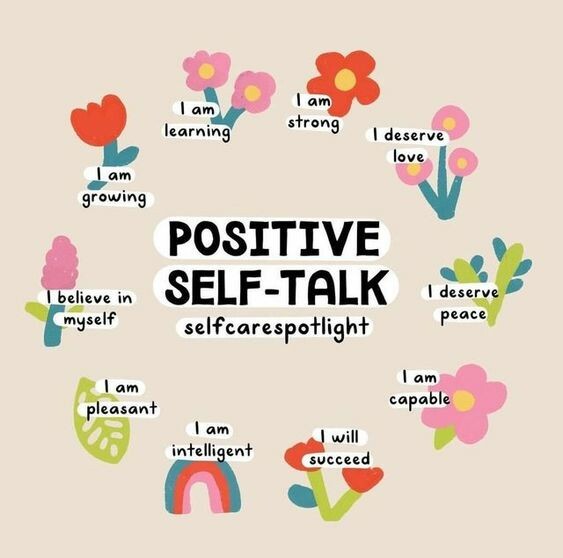Positive Self-Talk: What it is & How to Practice it

As you begin this article, take a moment to pause and really think about these next questions.
When you woke up, what first crossed your mind? Did you embrace the day with eagerness, or do you find yourself hesitating and perhaps feeling a bit apprehensive about what’s to come?
How would you describe your general outlook on life? Do you tend to approach each day with hope and positivity, or do you often find yourself grappling with overwhelm, stress, or anxiety?
When life throws you hurdles, do you tackle them with confidence and self-assurance, or do they seem insurmountable to overcome?
Your perception of the world and your personal life is an example of how you speak to yourself. What you think about your life's circumstances - positively or negatively - could reveal how you generally judge yourself and the world around you.
This internal monologue is called self-talk.
What is Self-Talk?
Self-talk is the way that you speak to yourself, either verbally or through your thoughts. These conversations are influenced by your subconscious mind and are a direct reflection of your thoughts, beliefs, and sense of well-being.
Most importantly, it’s an indication of your relationship with yourself. Research shows that your thoughts are generally more loving, encouraging, and positive if you have healthy and stable self-esteem. These types of thoughts help you perform better, manage stress more effectively, and improve overall mental health.
In contrast, negative thinking can lead to pessimistic and self-limiting beliefs, decrease your resilience to adversity, and sabotage your current and future successes.
At its core, self-talk is a manifestation of self-love. Just as you would speak kindly to someone you love, the way that you speak to yourself is also a good indicator of how much you value yourself and believe you are worthy of being kind towards.
Some Examples of Self-Talk
- “I’m unhappy with my life, job, or what I have to deal with today. I’d rather not have to talk or face anyone today.” (negative)
- “Things might not be perfect, but I’m grateful for what I have and what I can do with my life and time today.” (positive)
- “I wonder if what I said was okay - their reaction makes me feel some type of way. What if I offended them?” (negative)
- “I think I’m doing okay. I may not be perfect, but I’m trying really hard and I recognize my effort. I’m making progress and that’s all that matters.” (positive)

The Benefits of Positive Self-Talk
Aside from improving your mood, practicing positive thinking and embracing an optimistic outlook can be beneficial for many physical health reasons, such as stronger immune functions, cardiovascular health, and an enhanced sense of general well-being.
Positive self-talk also boosts many aspects of mental health. If you’ve ever practiced affirmations, you may have experienced how speaking kindly to yourself during hard times can give you a sense of peace and encouragement.
How to Practice Positive Self-Talk
Changing your inner monologue can be hard. Depending on our age and individual experiences, you are already predisposed to a certain way of thinking. However, it’s never too late to change this and create a life that is kind and compassionate to yourself!
The first step is to be aware of your inner monologue and evaluate it objectively. Don’t be too hard on yourself during this process. Remember, you are not doing this to judge yourself but to help you thrive. Try to keep open-minded and allow yourself to be okay with what you find.
Here are some questions to ask:
- Do your thoughts veer towards a negative conclusion (ex. I am wrong; I did something wrong), or do they make you feel encouraged and uplifted?
- If you were to tell these deepest thoughts to a friend or family member, would you be comfortable?
- How would you feel if someone you love told you these same thoughts?
- Are there common themes to your thoughts and feelings? Some could include: feeling not good enough, feeling like you are “bad” at your core, or thinking that you’re always in the wrong.
Write your findings down. This will help you identify these thoughts and feelings clearly. This may be uncomfortable, but have faith that this is a process that will help you feel better.
Next, take a look at what you’ve written and pay attention to those thoughts that are negative. Consider whether you reframe them into a positive, or neutral statement?
For example:
A negative thought:
- I don’t have the skills to finish this before the deadline!
Neutral reframing:
- I may need additional support or resources to finish this before the deadline. What can I do to help myself with this?
Positive reframing:
- I’m not perfect, but I can still try my very best to finish on time. If I can’t, what are some tools that can help me do better next time?
- What can I work towards to help me be more successful? I can always improve, and I believe I can do better next time.
Be kind to yourself as you review your negative thoughts. It can be tough to change the thought patterns you’re so used to, but this doesn’t mean that it’s impossible to do.

Ways to Build Awareness and Make Effective Change:
Noticing if your thoughts are positive or negative helps you catch them before they spiral into something bigger.
If they are a negative thought, putting a label on it can help you work through it more effectively.
For example, if you’re used to saying “I can’t handle this!”, or “This is impossible!”, you are already limiting the possibilities of that given situation before it even begins. Recognizing that these are limiting beliefs can be a starting point to reframing it differently.
If you start having negative and overwhelming thoughts, here are some steps you can take:
- Stop, and take a deep breath.
- Don’t keep thinking or feeding the thought. Instead, write it down.
- Evaluate it objectively - ask yourself if this can be reframed in a way that is encouraging for you and write that down.
- Try to stay kind and be gentle with yourself as you work through this. You are not trying to beat yourself up, but make changes that help you in the long run.
Acknowledge what you can do to change the things you do not like about yourself, your life, or your surroundings, and try to focus your attention, actions, and energy on that.
Help You Can Seek
Remember, if you wish to make successful changes, you need to envision the life that you want to live. In your journey towards being the best that you were meant to be, do not let any negativity — especially from yourself — dampen the fire within.
If you still find it difficult to challenge your negative self-talk and need support to improve the way you communicate with yourself, The Family Centre can help.
We offer classes and workshops to build your self-esteem, communication skills, and other areas of personal development. There, you can learn to resolve conflict, set boundaries, and assert yourself.
Self-Improvement Classes: